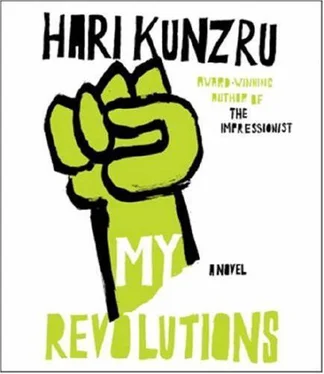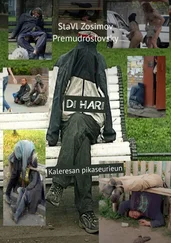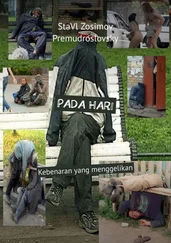So much has been written about Anna, almost all of it wrong. She’s been reduced to the woman in the Copenhagen photo, with her fist raised out of the embassy window. It’s impossible, I suppose, to separate who she became from who she was in 19 68, but that masked figure is as much of a cartoon as Byronic Sean Ward. The Copenhagen woman stands for death, death to the pig state, death to the hostages. If I say I think Anna was motivated by love, it sounds banal, an old hippie talking. Or an old lover, blinded by sentiment.
We had so many questions about Paris. Why were the unions asking their members to go back to work? Why was it all falling
apart? The next day at Free Pictures, Anna ran a question-and-answer session for an audience of almost a hundred people, drawn from every niche in the feral ecology of the London underground. Pure word of mouth, as far as I could tell. Bush telegraph. Sean pointed out a who’s who of local activists. The Black Power crowd, the neatly dressed Leninists from the orthodox Communist Party. Anna was an eloquent speaker. She’d arrived in time to participate in the enormous street demonstrations of early May and “both personally and politically” the previous six weeks had “felt like a lifetime.” The situation was now very uncertain. De Gaulle had called an election. Yes, some of the immediate revolutionary potential had dissipated.
As she spoke I peered at her. Under the bare bulb her head was a collection of angles, futurist splinters of cheek and brow. Her voice was made to sway a crowd. As she talked she leaned on a chair, using its back as a lectern and sweeping the darkened room with one hand, gathering us all up into her intensity. I thought that gesture was the most graceful, truthful thing I’d ever seen. When she smiled, which she did often, I wanted her so much I could have cried.
* * *
The area around Notting Hill was a crappy part of town in those days, a couple of square miles of rotten ghetto housing cut through by a half-built flyover, but it supported a ramshackle counterculture made up of hundreds of cliques and groups and communes, little magazines, support groups, co-ops, bands. By finding my way to Free Pictures I’d fallen straight into the middle of a place with its own geography, an anti-city of bed-sitters and bookshops, rehearsal rooms and cramped offices.
I’d also stumbled into the middle of an elliptical game that Sean and Anna were playing with each other. For the rest of that summer everything happening in the world, however big — Czechoslovakia, Bobby Kennedy’s assassination — was, if not exactly subordinate, then wrapped up with what was taking place between them. Like a fool I became willingly, even eagerly entangled. Poor Saul Kleeman was in as deep as me: we’d both fallen out of our own movies into theirs.
Sean and Anna had been together before she went away, but monogamy was never part of their arrangement. This was both a personal and a political decision. Like many of us, they were moving toward the view that the building blocks of the oppression we all felt, the molecules that made up the vast body of the capitalist state, were psychological ones. A revolutionary transformation of society would require a transformation of social life, a transmutation of ourselves. Everything about my own family confirmed this. If I was to be free, I had to be free of them. But I also had to recognize that they were prisoners too. It wouldn’t be enough to kill Daddy and marry Mummy. We had to kill the engine that generated all the daddies and mummies, throw a clog into the big machine.
In the meantime, Sean and Saul were going to compete for Anna. I think she set it up: a lesson or an experiment. Of all of us, she was the only one who had real experience of the world. She was in her late twenties. At one time she’d been married to a photographer, running around in Chelsea wearing fake eyelashes and A-line dresses. The marriage had lasted only eighteen months but remained with her as a kind of hinterland, an intolerance of certain things and people, an address book filled with scribbled-out names. “It’s OK being put on a pedestal,” she once told me, “until it’s built so high they start to feel afraid of you. Then they hate you and after that it’s all they really want to do, the hating.” One of the many striking things about Anna was her indifference to her own happiness and comfort, even her personal safety. I think she came increasingly to consider herself unimportant, except as a vehicle for the revolution. The rest of us tried to cultivate the same selflessness, the same erasure of personal preference, but Anna could always go further, could always get closer to absolute zero.
If Anna was self-negating, Sean was fiercely present. He wanted Anna. He didn’t want Saul to have her. But Sean wanted a lot of things. Did he love her? That depends, I suppose, on what one means by love. Sean would use the word in a way that made it seem like a kind of freedom, a moral energy he intended to project through the world by sheer force of will. Love was freedom, so love had to be free. It was all walls and bars and cages with Sean. It was all breaking things open, smashing them apart.
If you believe in free love — not in the sense of promiscuity, but in its true sense — as the release of libidinal energies from any restraint, any check whatsoever, the barrier between desire and action becomes terrifyingly thin and permeable. I take my desires for reality because I believe in the reality of my desires. How many of us could actually live like that? Is it even possible? We all tried, and both Sean and Anna got closer than I did. I can say that about them. At least I can say that. So yes, love . Love firing off in all directions.
Saul never stood a chance. If I fared better, it was only because it was a long time before I even admitted I was in the game.
Sean’s first tactic in his offensive against the invader was blitzkrieg household disruption. The next day he rousted Anna and Saul out of bed so he could replaster a section of bedroom wall that, until then, he’d been perfectly happy to leave to crumble behind the paper. In subsequent days he took up floorboards, moved people and furniture in and out of the house, creating a sort of permanent domestic revolution, a constant flux designed to unsettle everyone as much as possible. Once he’d filled the place to bursting, he took the door off the toilet and started forcing people to share rooms, accusing anyone who argued with him of bourgeois individualism. There was to be no privacy. Helen and Matthias had to sleep alongside two anti-apartheid activists from Birmingham. I spent a night wide awake on a mattress in a corner of the largest bedroom, watching Saul and Anna fuck in the orange glow of the streetlight outside the window. Once or twice her eyes caught mine.
Initially, Saul was happy enough to put up with Sean’s dislike of him, even to take a little pleasure in the chaos he was causing, as long as he had Anna. On the surface, he and Sean were quite friendly with each other. Then one weekend Sean held an impromptu party that started on Friday afternoon with three friends and a bottle of Dexedrine and ended thirty-six hours later with half the transient population of Ladbroke Grove inside the house. By the end of the first day Sean was higher than I’d ever seen him before, a ragged ringmaster goading people on to perilous heights of excess. Someone had rigged up a PA in the kitchen, which played a mixture of ska and R & B and acid rock, depending on which faction had seized control.
The first most of us knew about the raid was when the police pulled the plug, shorting the electrics and plunging the place into darkness. I was upstairs, arguing about something or other with Matthias, when everything went black. There were sounds of panic from the hall and someone called out, “Pigs! Pigs!” which cued general swearing, hiding of stashes, tripping over and crashing around. A minute or two later a flashlight was shone in my face.
Читать дальше












